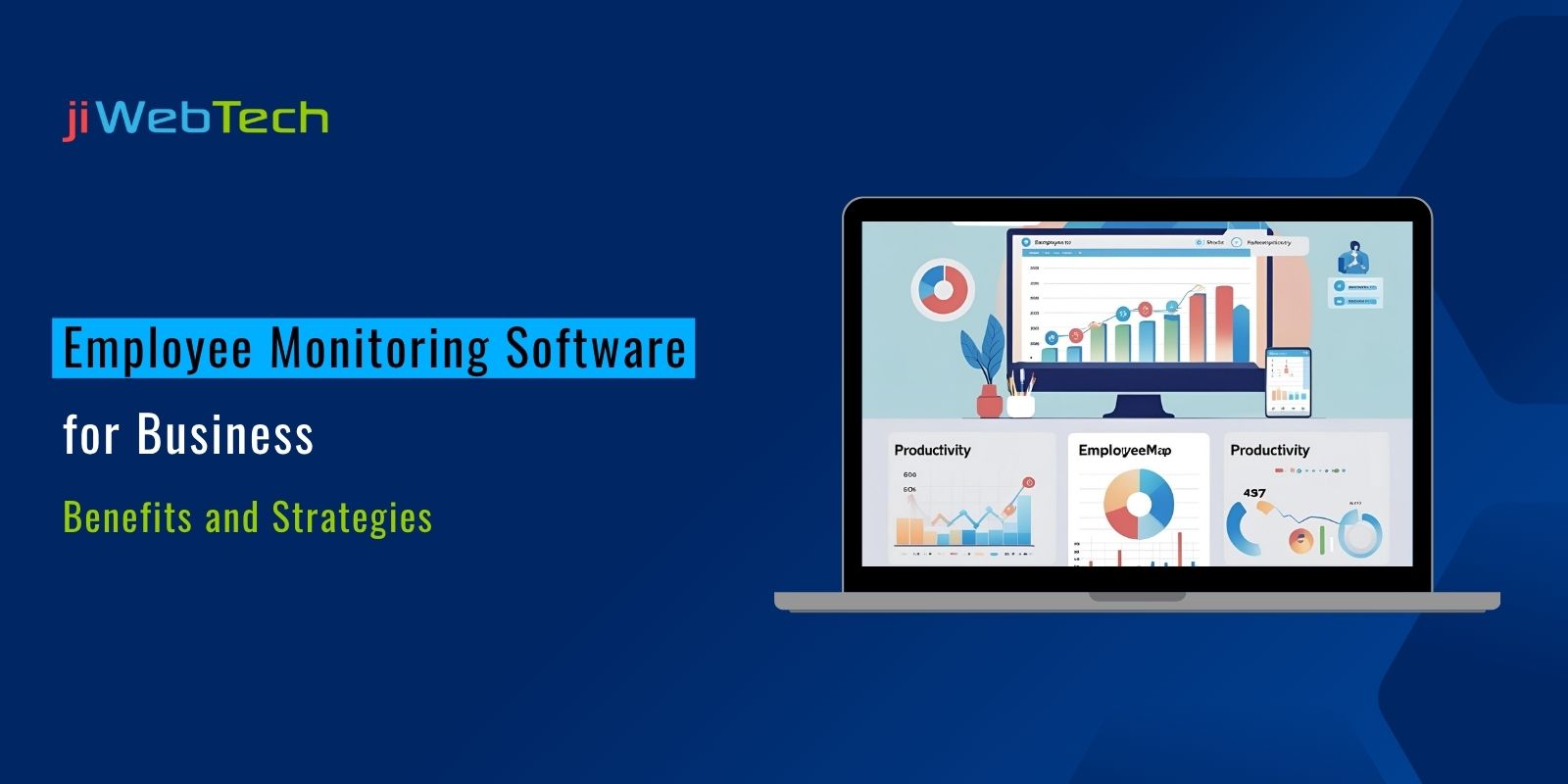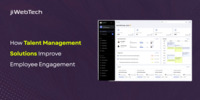- May 29, 2025
- Talent Management
- 2262
Share this post on:

As more people started working from home, many companies have turned to using employee monitoring software to monitor their employees. We studied how these tools have helped businesses worldwide and what tools and strategies can help businesses improve their productivity.
The market for employee monitoring software is growing fast, and there are a lot of studies that evaluate their impact and effectiveness. According to statistics, the employee monitoring market is expected to reach $12.5 billion by 2032. 80% of in-office companies track office attendance, 37% of remote companies use video surveillance, and more than 40% of employees know that they are being monitored.
The demand for global employee monitoring solution market revenue is increased by the adoption of remote working practices and the increasing need for employee productivity tracking, driving the demand across all deployment types.
Employee Monitoring Software is a technical solution that allows businesses to track, record, and analyze their employee's activities. This software includes monitoring internet usage, application activity, time spent on tasks, and email communications, depending on the software’s capabilities. The primary goal of the software is to ensure that employees stay productive, follow company policies, and safeguard the organization’s assets.
We live in an era where remote work is common and tools such as employee monitoring offer managers visibility into work patterns and help maintain accountability regardless of your physical location.
Benefits of Employee Monitoring Software
Employee monitoring software is invaluable for enhancing productivity and security. It is crucial to implement them thoughtfully, otherwise, these tools can hinder the trust of your employees. Let us go deeper into the benefits of employee monitoring software:
Increased Productivity: Employee monitoring software increases productivity by developing a structured work environment. By doing so, employees stay conscious of their activities and take care of their work. Hence, they tend to minimize distractions including excessive use of social media, personal browsing, or unnecessary breaks. This increases their focus on their tasks, helping them do better time management and give quality output.
Enhanced Security: Nowadays, Cybersecurity is one of the major concerns for businesses of all sizes. Hence, employee monitoring software plays an important role in tracking data access and usage patterns. This helps businesses reduce the risk of data breaches and cyberattacks. Employee monitoring software can detect unusual or unauthorized activities such as accessing restricted files, downloading sensitive data, and much more.
Insider Threat Prevention: Insider threats come from employees, contractors, or business partners. In general, the threats range from accidental data leakage or theft. In such cases, employee monitoring software is an effective way to stop such risks by constantly observing user behavior, and flagging suspicious activities. This software can detect patterns such as repeated attempts to access confidential data or emailing of sensitive information. Hence, it is crucial to have employee monitoring software. When employees know that they are being monitored, the likelihood of engaging in such behavior decreases.
Real-time Monitoring: Real-time monitoring allows management to observe employee activities as they happen, providing immediate insights into potential issues. This is valuable in remote or hybrid work environment setups, as physical supervision is limited. Real-time data help managers make informed decisions such as relocating resources to urgent tasks or addressing productivity.
Better Collaboration: Employee monitoring software offers valuable data. This data helps management understand an individual’s strengths, work habits, and capacity. Having data and knowledge of all employees improves quality and efficiency. Moreover, monitoring tools can highlight collaboration patterns and communication flow in the team. This helps employees interact efficiently with each other, creating an environment where workloads are balanced and collaboration is optimized.
Strategies for Effective Employee Monitoring
If employee monitoring software is implemented thoughtfully and transparently, it can be an extremely powerful tool for enhancing productivity and data security and managing remote teams effectively. Here are a few powerful strategies for effective employee monitoring:
Transparency and Communication: Implementing employee monitoring software without clear communication can develop a lot of mistrust and low morale. Hence, it is important for businesses to stay transparent about what is being monitored why it is necessary, and how the data will be used. So, how do you maintain transparency among employees? Conduct informational sessions, provide written policies outlining monitoring practices, and address concerns to foster a culture of trust. When employees feel respected and informed, they will see monitoring as a positive workplace tool.
Focus on Work-related Activities: Monitoring should be limited to work-related activities. This will help businesses maintain ethical standards. Do not collect the personal information of employees or monitor private communications. Ensure to focus on tracking metrics that directly impact performance including application usage, task completion times, and internet activities related to work.
Use Data to Support Employees: The monitored data must be used for the benefit of employees and to help them improve their work. It is crucial to identify patterns that indicate workload issues, skill gaps, or disengagement, and provide targeted support such as training, counseling, or workload adjustments. Ensure to recognize and reward high performers based on objective data to motivate the workforce. Using monitoring insights to understand employee development can help businesses develop a positive work environment and reduce turnover.
Balance Monitoring with Privacy: It is crucial to create an environment where employees feel respected. This helps businesses maintain trust among employees. Hence, be sure to limit data collection to what is important and implement strict access controls to keep your data safe. Further, regularly review monitoring policies to ensure they align with evolving privacy laws and industry standards.
Conclusion:
In conclusion, an employee monitoring tool is powerful when it comes to increasing the efficiency of your business. Selecting the right tools, and adopting transparent and employee-centric strategies can support your organizational goals without compromising trust and privacy.
So, if you are looking to opt for the best employee monitoring software solution, jiWeb Technologies is here to help. We have offered the best solutions to businesses worldwide and helped them manage their business and increase the productivity of their organization. Take the time to evaluate your organization’s needs that align with your goals and values.
Do you want to learn more about how employee monitoring tools can improve your organization’s productivity? Contact us today to learn more.
Frequently Asked Questions
1. What is employee monitoring software and how does it work?
Employee monitoring software is a tool that helps companies see what their employees are doing on work computers. It can check which apps they use, the websites they visit, and how much time they spend on different tasks. This helps managers understand how employees are working and if they need any help.
2. Is it legal for companies to monitor employees? Do they have to tell them?
Yes, companies can usually monitor employees if they use company computers or the Internet. But they must follow the law and tell employees about the monitoring. Being honest about it helps build trust and keeps things fair.
3. What good things can employee monitoring software do for a business?
This software can help employees stay focused and get more work done. It also keeps company information safe by spotting any bad or risky actions. Managers can use it to give the right tasks to the right people and save time on paperwork like tracking hours.
4. Can this software watch employees who work from home?
Yes, the software works no matter where employees are working—from the office or home. It helps managers keep track of work and make sure everyone is doing their part, even if they are far away.
5. How can companies use monitoring without making employees feel bad?
The key is to be open and explain why monitoring is needed. Companies should only watch work-related things and not pry into personal stuff. They should use the information to help employees improve, not to punish them. This way, employees feel respected and stay motivated.









